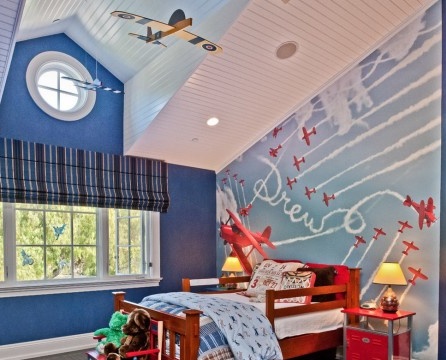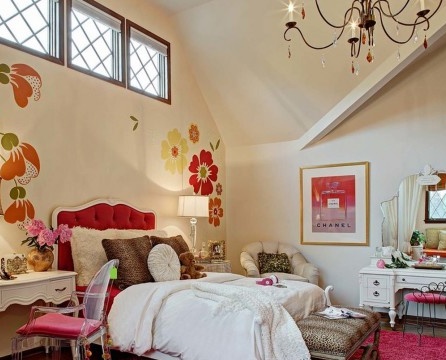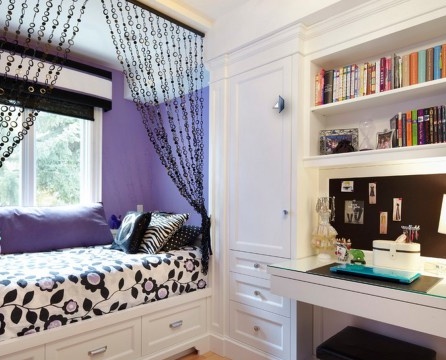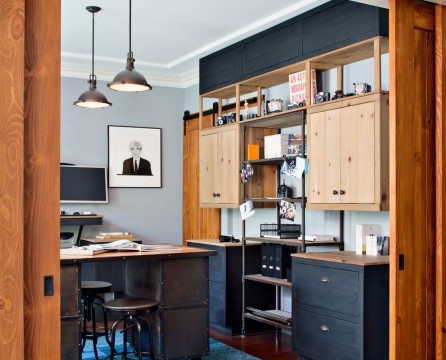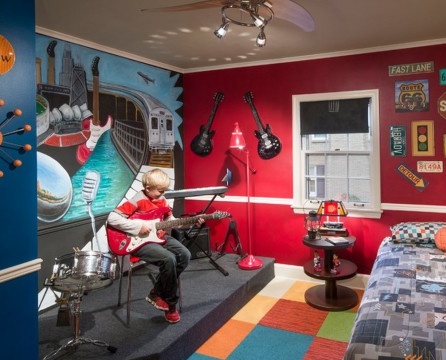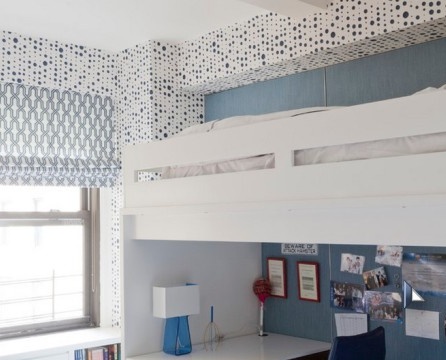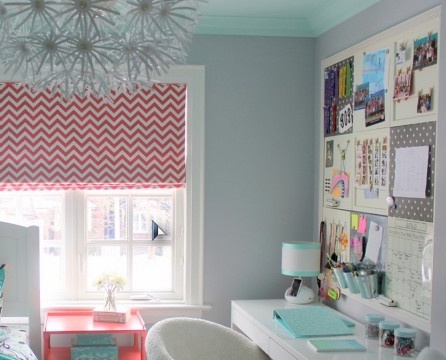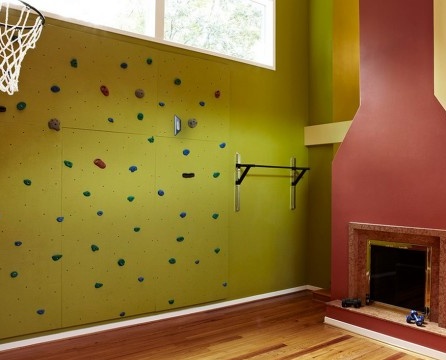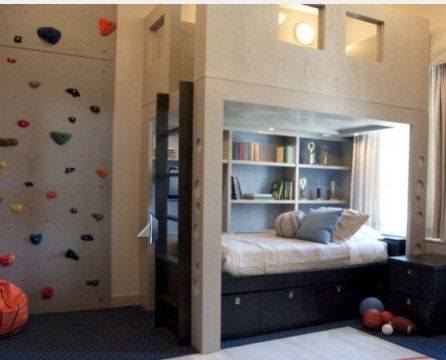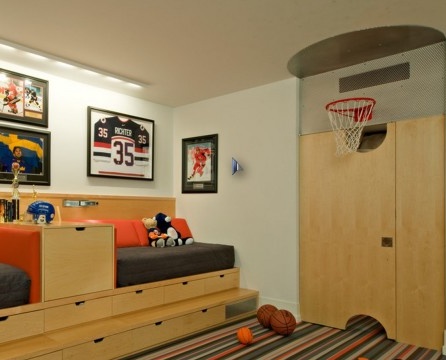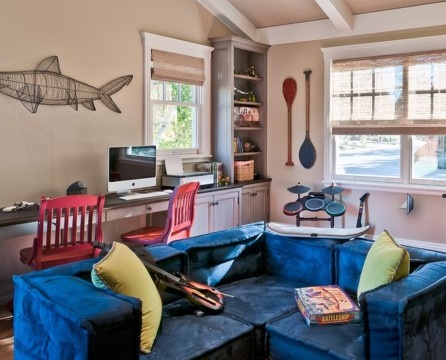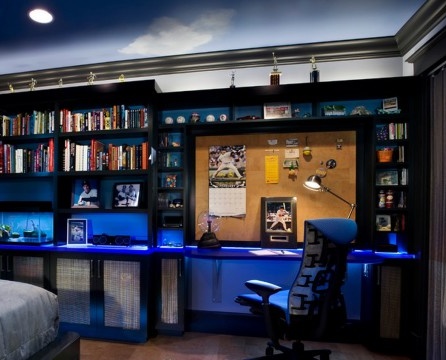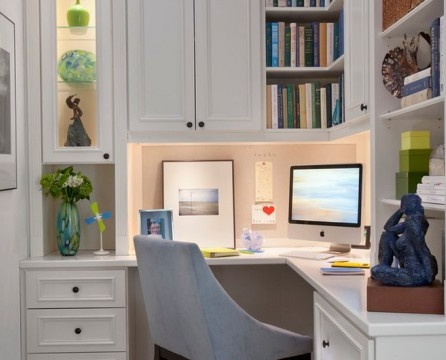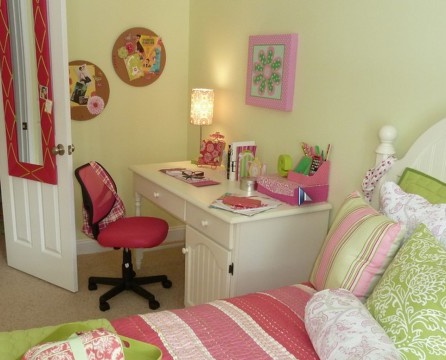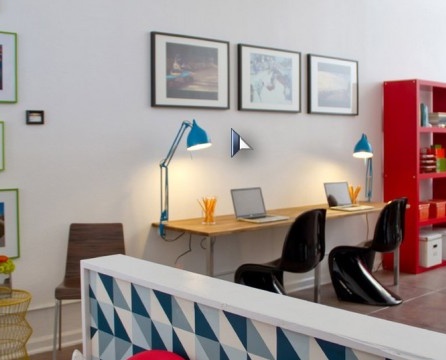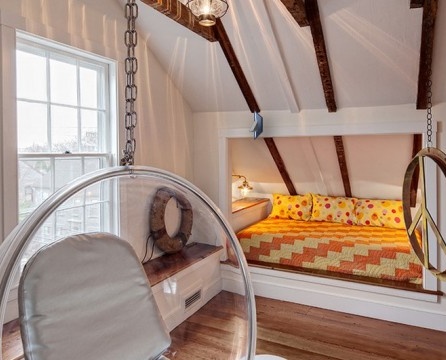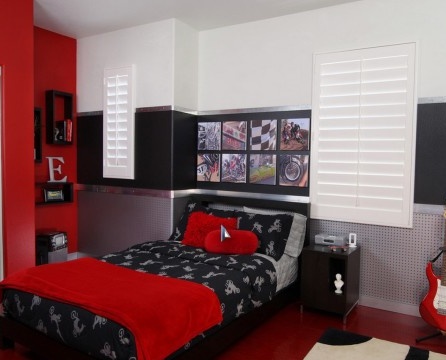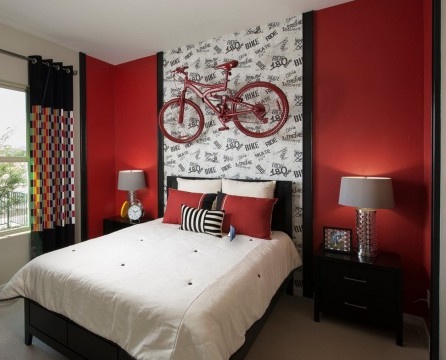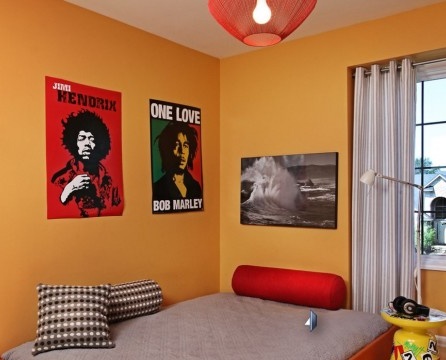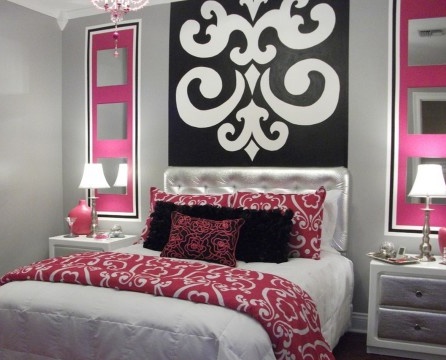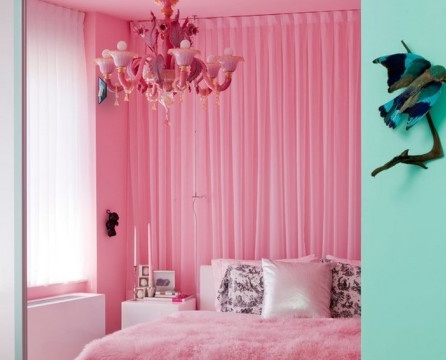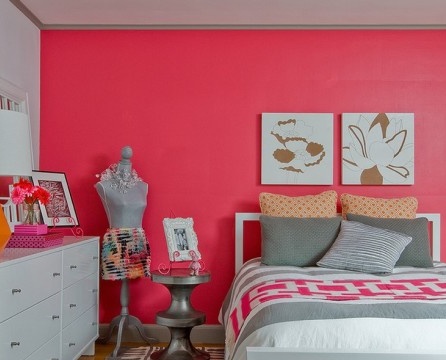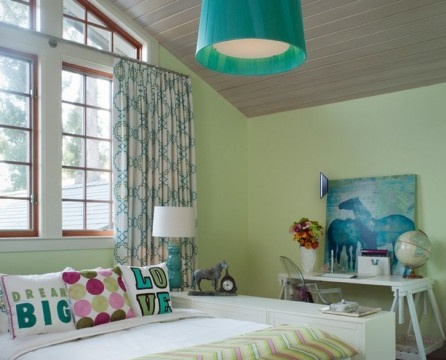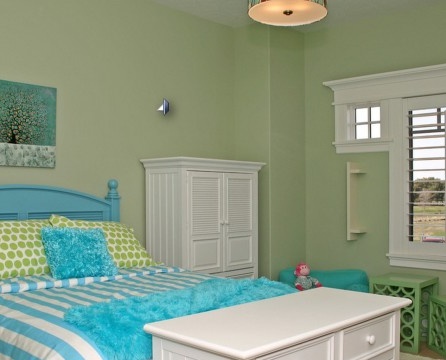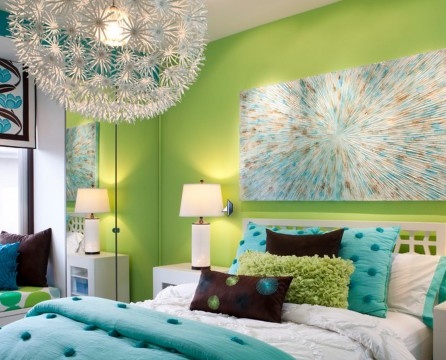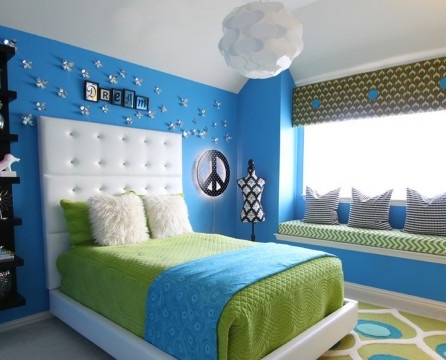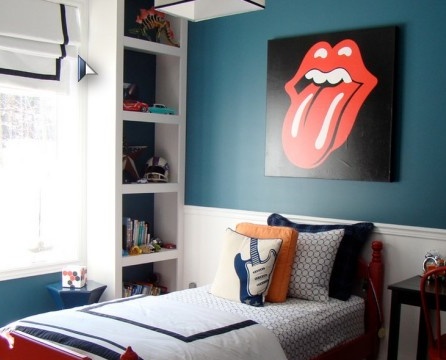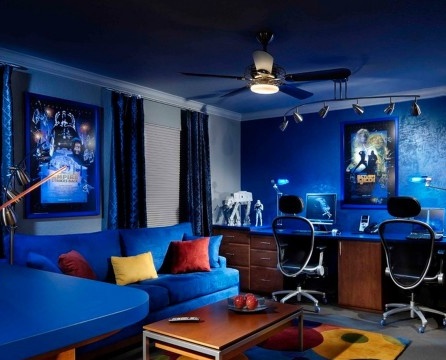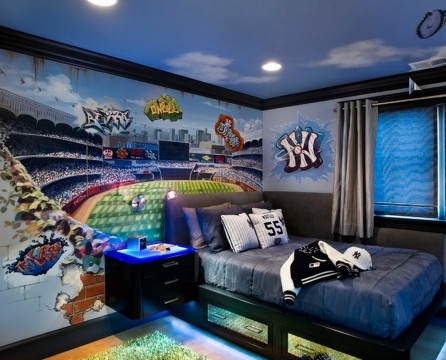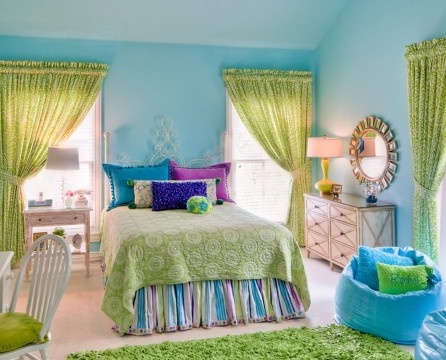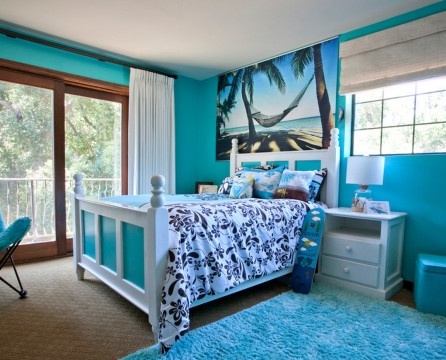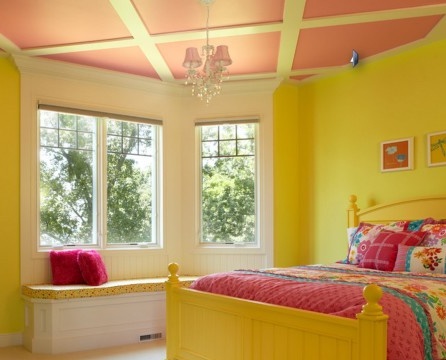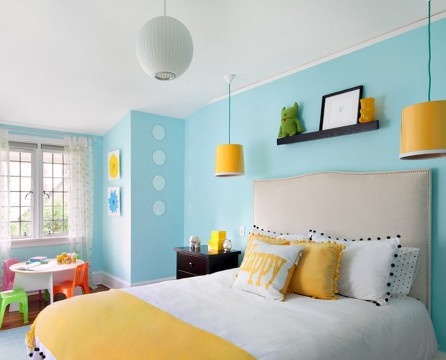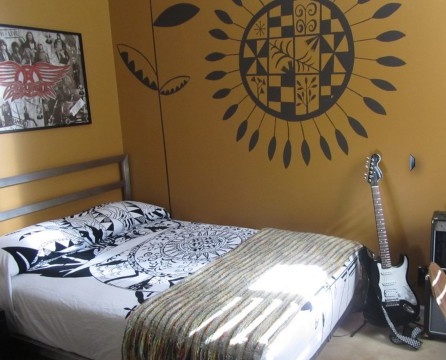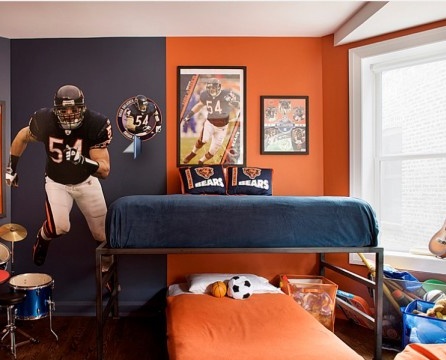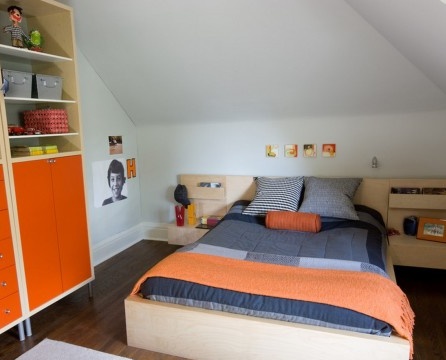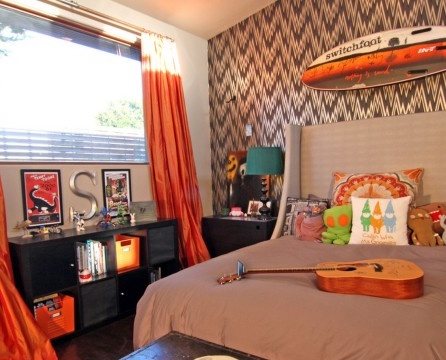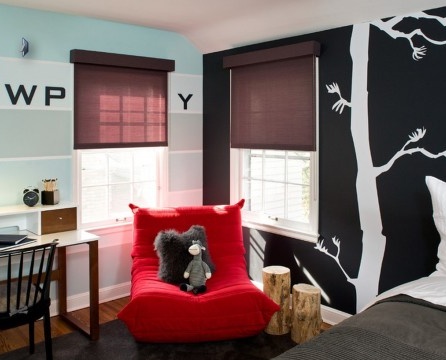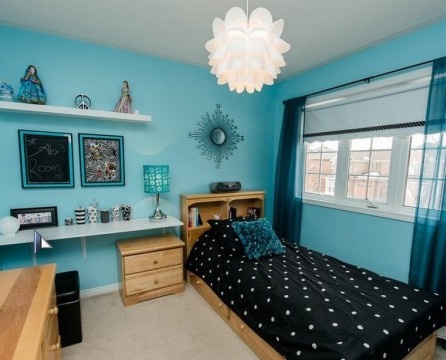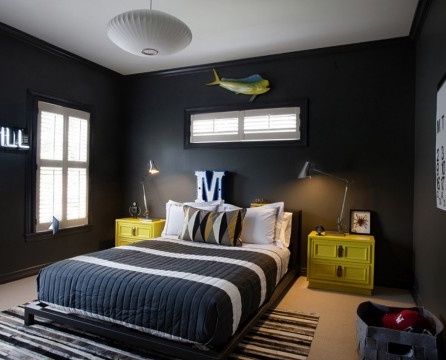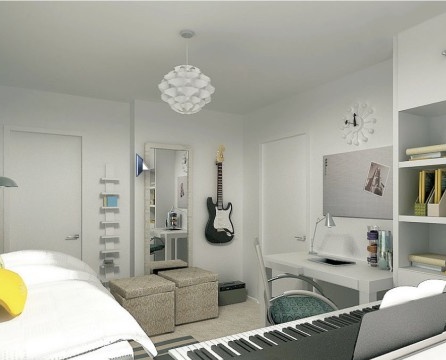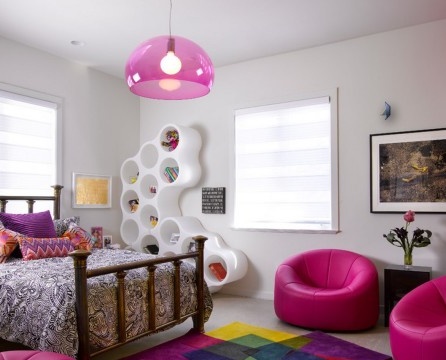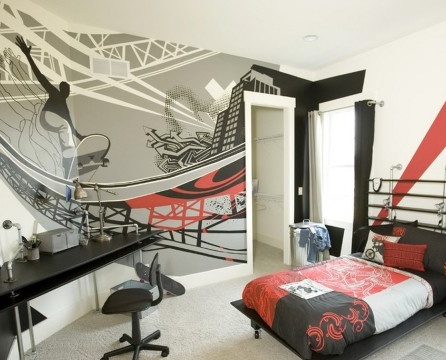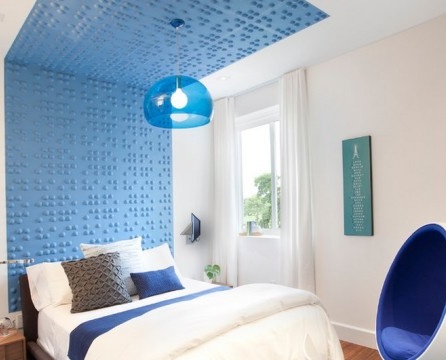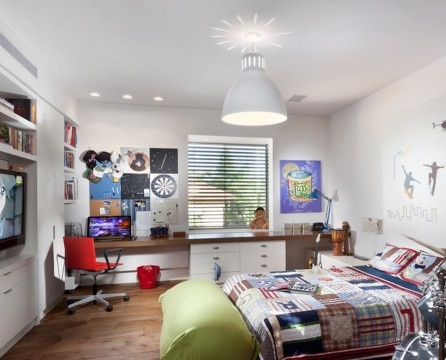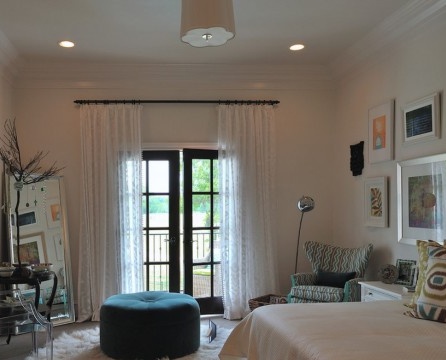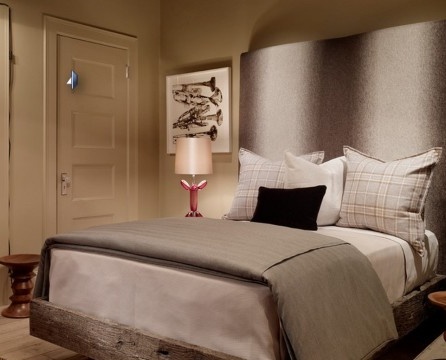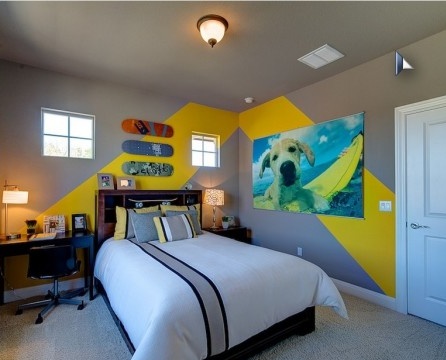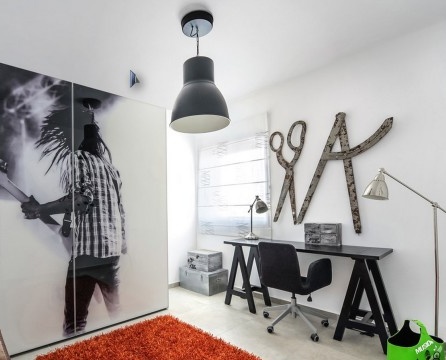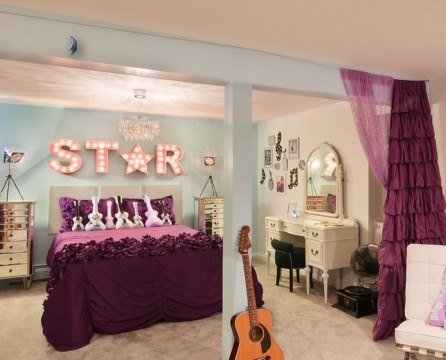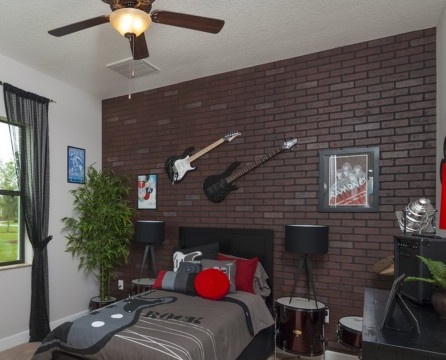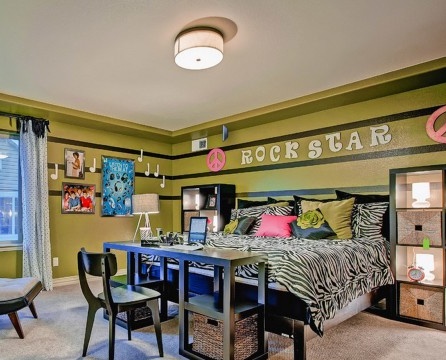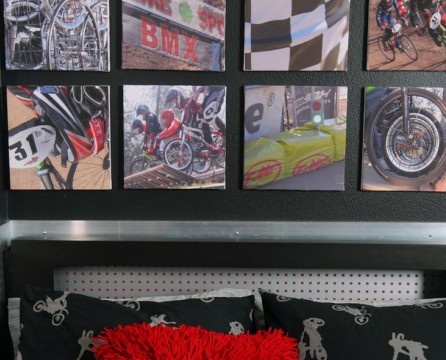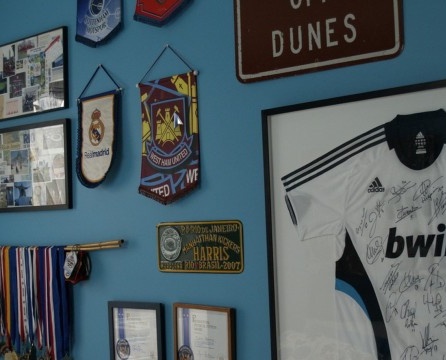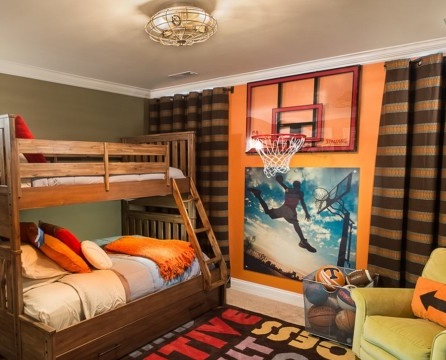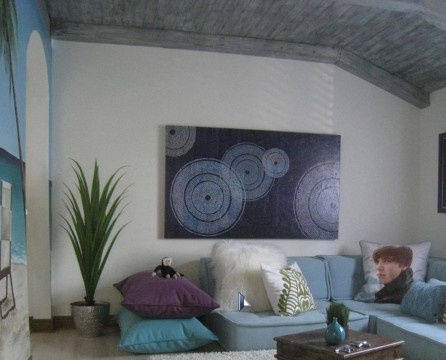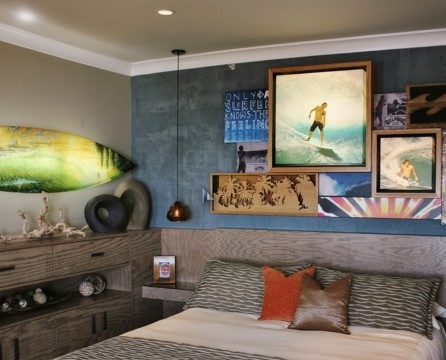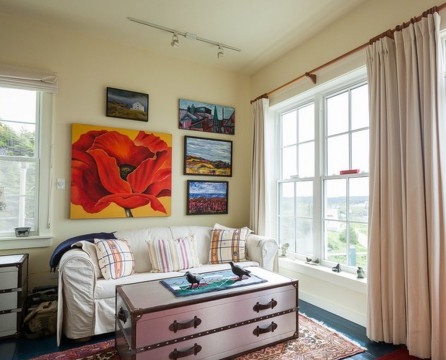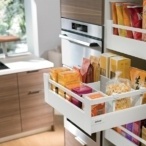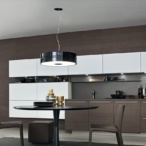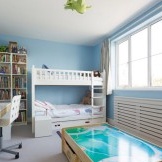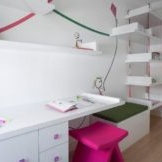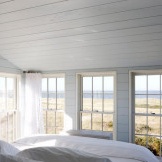Teenager's room - opinions, advice of designers and psychologists
"Oh, young green." That’s how they always said and are talking in Russia about a man who is unconscious, who knows little about life, but, at the same time, considers himself versed in it. Of course, you already understood that we are talking about the younger generation, that is, about adolescents, the world around them, the view on which they have is somewhat different than that of adults. And the way they see it or want to see it is reflected in that part of the space, which is called the teenager’s room.
But not without reason this article began with a popular saying. Teenagers tend to make mistakes, as a result, the space surrounding it can be represented in a form that will not have a beneficial effect on it. For the most part, adolescents adhere to the collective worldview of the comrades surrounding him, a kind of "herd". And the teenager embodies this worldview in his room. Therefore, psychologists recommend that parents who want to raise a normal person, take care of the environment of their son or daughter, no matter the space, to participate in its creation. And the teenager’s room should be in every way possible. But her design is a very difficult job. On one parental intuition it can not be fulfilled, certain knowledge, advice from psychologists and designers is needed. And this article will help you avoid mistakes in the design of your teenager’s room.
Teenager Room Features
First, let's figure out what is the peculiarity of this room, how it should differ from other rooms. At first glance, the look of an adult is nothing. Fortunately, you reader do not think so. Otherwise, you would pass by this article. But this did not happen, so we go further, get acquainted with these features and with the opinion of specialists about them.
The possibility of solitude, protection of your world
The main feature of the room is the opportunity for a teenager to feel in his own world, a world in which he will be able to keep his secrets and in which no one will invade his absence, without his knowledge. And the first thing a teenager asks you is to install a door to his room. Of course, this is an idyll, but this is exactly how every teenager presents his room. There are options, but the essence of all of them will be reduced to one thing - the possibility of privacy. True, psychologists are wary of this, but here you should already think about overcoming this "deaf protection."
The opportunity to do what you love
The teenager’s room must have some space where the teenager can do his favorite thing. Designers and psychologists call it a work area and highly recommend it. But the teenager comes into his room not to work (his work is yet to come), but to relax and do what he loves. This is a very important point in the interior of the room. A teenager, entering a room, should find in it an opportunity to do something, and not lie on the bed, staring stupidly at the ceiling. Even listen to your favorite music, preferably doing something else interesting and useful.
I especially want to stay at the sports corner in the room. Medicine and psychologists recommend the organization of such a corner, because adolescence is characterized by mobility, energy. In any room, if desired, you can find a place for a horizontal bar, the Swedish stairs, a pair of dumbbells. This is especially necessary for teenage boys. Moreover, it is not difficult to do this - in sports equipment stores you can buy everything for such a corner.
A workplace for study, creativity is strictly necessary
The room must necessarily have a place (zone) where a teenager can work on homework, with a computer, or tinker with something. Everything should be comfortable here, to “force” the teenager to spend time with pleasure. And this is very important, since in adolescence, studies are slowly relegated to the background.
If your child is diligent and purposeful, the workplace can be organized on one large table, on which places for study, working with a computer, and creative work will be allocated. This option is appropriate for a shortage of room area.
But it’s better not to be tempted in the form of a nearby computer. Therefore, experts recommend having two places: for study and for working on a computer.
Not the last role in the design of the workplace is furniture. Her originality will increase the interest of the teenager in classes. It’s one thing to learn lessons sitting on a chair, another is to sit comfortably in an original form chair. And if there is a similar chair for a friend, then ... Believe me, it works. Especially if work on homework is connected with a computer.
The color scheme of the room is an “influential” feature
The approach to the color scheme in a teenager’s room should be conscious, because the influence of color on a person is huge, especially when this person is just entering the world. The psychological and physical well-being of the adolescent depends on the surrounding color background. Studies have established this relationship. When a blindfold person was placed in rooms with different color backgrounds, his reaction changed.
The main requirements for a teenager’s room are to stimulate his mental activity and, at the same time, provide a good rest. Therefore, in order to have a minimal idea of the psychological effect of color on humans, we turn to the recommendations of psychologists, doctors and designers.
Experts say that:
Red
Red color increases human activity, in some cases causes aggression in him. Therefore, before deciding on the "red" room, you should know what kind of psychotype your teenager belongs to. It is clear that for an active teenager, the room needs to be decorated in calmer colors. If you really want to have a red color in the interior, then it can be represented as all kinds of accents. It can be red pillows, furniture, accessories, curtains.
Pink
pink color - specific. Only suitable for teenage girl rooms. The color itself and its shades are considered the most energetic, but, unlike red, extinguishes anger and aggression. So that the color is not catchy and sugary, you can add some light colors. Despite the fact that some observers of morality have assigned pink color to immoral colors (according to modern "concepts"), you should not pay attention to this. Pink color makes the room cozy, delicate, which should, by definition, be present in its interior.
Green
green color is the most common color in nature, creates a feeling of unity with nature. And what else can have a beneficial effect on a person, like the presence of nature itself, its flowers in the surrounding space. Therefore, the "green" room will have a calming effect on the teenager, reducing its excessive activity. But parents should know that with an excess of green, the opposite result is possible: a teenager will have relaxation, which will develop into elementary laziness. Therefore, one should not be too diligent with the green color in the room. Looks great in combination with blue and its shades. This combination will help you compensate for the excesses, remove the negative emerging in this case. Preference should be given to juicy shades of green, so as not to turn the room into an operating room with a gray-green background. In the latter case, the use of other colors will not help you.
Blue and cyan
blue color the effect is akin to green. Symbolizes peace and tranquility. Relieves nervous tension and fatigue. It will be useful in a teenager’s room, especially if this room is small in area, as the blue color and its shades visually expand the space. But here, a measure is needed, since the excessive presence of a deep blue color can cause a teenager to feel sad and lonely.
if blue color symbolizes the depth of the ocean, then blue color is the color of another ocean, airy. According to this definition, the blue color will help to make a teenager’s room an infinite space, like the sky. The color is good for decorating ceilings and walls in a small room, as it will visually expand it.
Yellow
yellow brings to the room a feeling of vivacity, joy of life, faith in oneself and that everything will be fine. This color will be, by the way, by the way, for the teenager, since life at his age is full of situations when he needs this particular yellow property. In addition, yellow and close tones contribute to the development of mental abilities and curiosity. However, it should not be used in the painting of walls, ceilings, floors, especially if these are dark shades. Better if he will be present as an accent. In this case, the impression of the presence in the room of particles of the sun, which will be embodied in accessories, furniture, bedding. But if you use pure yellow, then it will be quite appropriate on the wall and on the ceiling.
Orange
Orange color carries the same properties as yellow, but with a larger amplitude. The teenager’s room, where the orange color will be used, will have a cheerful sunny look. The situation in it will radiate warmth and comfort, which will be very useful if the room is in the northern part of the house. Looks great as an accent.
The black
black color is not suitable for a teenager’s room, as it creates a depressing emotional background. Therefore, despite the fact that often a teenager is drawn to this color for some reason, you should talk to him and explain the negative of this color for his room. Of course, this does not mean at all that black should be completely excluded in the interior of the room. Its presence in small proportions will bring some freshness and originality to the color scheme of the room.
White
white, despite the fact that it is spectrally opposite to black, in terms of human exposure, it is similar to it. The predominance of white in the interior will cause boredom and disappointment in a teenager, which, of course, will affect his psycho-emotional state. Not even a single person has the appearance of a hospital ward (and this is how the room will look in this case) did not cause positive emotions. But this situation can be corrected by adding bright colors represented in the form of colored curtains, pillows, accessories, furniture to the “white silence”. The presence of black color as an accent perfectly removes negative, so to speak, a wedge is knocked out by a wedge.
We got acquainted with the main colors used in the design of the room, their effect on the teenager, with the recommendations of specialists. But using pure colors is not recommended. As for all kinds of combinations of colors, their shades, this issue requires a separate consideration, and we will try to return to it a little later. In the meantime, consider how varying colors allows you to create the right style in a teenager’s room.
Eye health - especially lighting
The fact that the room should be bright, say both doctors and psychologists. Doctors remind that at this age a big load falls on the eyes of a teenager. If poor lighting is added to it, then in the near future you will have a "trip" to the optometrist, from which you will return wearing glasses. And psychologists draw an even harder and darker perspective.Poor lighting makes the situation in the room gloomy and depressing, which has a serious impact on the psychological state of the teenager, on his development. You probably noticed that if you put the plant in a shaded room, it, at best, will grow stunted and unviable. Such a prospect is unlikely to suit you.
If we talk about the rules for organizing the lighting of a teenager’s room, they are as follows:
- lighting should be moderately bright. According to generally accepted standards, this is fifteen to eighteen watts per square meter.
- lighting should not give reflections from surfaces.
- lighting should not allow a sharp transition from bright to dark background.
- There must be a common light source that illuminates the entire area of the room.
- Lighting should have a soft diffused character. As an example, spotlights of moderate power built into the ceiling (not more than sixty watts). A similar effect can be obtained by directing the hidden fixtures to the ceiling or walls. But do not get carried away by the number of built-in spotlights. Everything should correspond to the lighting calculations performed.
- unacceptable chandeliers made of crystal or made under it. Such chandeliers emit directional rays, which causes their reflections on the surfaces and negatively affects the eyesight of a teenager.
- It is desirable that the brightness of the room lighting is regulated by a special device - a dimmer. This will allow you to set the optimal illumination depending on the type of activity of the teenager.
- the workplace of a teenager must necessarily have local lighting. Its source can be an ordinary table lamp of directional radiation, but having the ability to adjust in height, direction and depth.
- the use of fluorescent and energy-saving lamps is unacceptable. The frequency of light fluctuations (flickering) of these lamps negatively affects the teenager's vision, causing eye fatigue. Halogen bulbs or conventional incandescent bulbs can help you preserve your teen's eyesight.
The style of the teenager’s room - an extraordinary approach
The peculiarity of modern adolescents is that between boys and girls there is almost no difference in hobbies and outlooks on the world. More precisely, the preferences and hobbies of teenage girls smoothly and imperceptibly moved into the sphere of interests of teenage boys. For example, a teenage girl can freely arrange a biker club in her room with all the relevant paraphernalia.
Fortunately, this metamorphosis did not affect the boys. Therefore, further we will talk about the interior styles of a teenager’s room, characteristic of both sexes. It is worth noting that in this case there is one feature. If in a room for adults it was possible to see some design style for certain elements, then a room for a teenager may not have certainty in style.
The reason is that the elements of self-expression of a teenager available in the design of the room could simply come to the fore, retouch the signs of a particular design style. And this is observed in most cases, because “a young, unfamiliar tribe”, you cannot drive it into the framework of a certain style. We can say that we are witnessing the birth of youth styles. But in this situation, psychologists and designers advise not to be an indifferent witness to what is happening in the teenager’s room, but to delicately go into the category of accomplice in order to help him to design the design correctly with his advice. And we, in turn, will help you by familiarizing yourself with the most common youth styles.
Music style
This is the most common youth style. A modern teenager, not a “fan” of any group or singer, is a black sheep in a teenage environment. And who wants to look like that. Therefore, in most cases, the teenager’s room is characterized by a musical style. The style, quite affordable financially, is easy to design.A teenager can make his own elements with his own hands. But designers warn about the "pitfall" in this style. This is the impermanence of a teenager in his hobbies: today - one musical direction, tomorrow - another. Given this inconsistency, the design should be framed in a mobile version. This means that wall paintings or murals of a musical theme should be avoided. Otherwise, the addiction of your teenager will cost you dearly. Find options where you can change elements of a musical style overnight with minimal expense. For example, the use of posters or stickers, very easily replaced by others, can serve as an excellent maneuver against the “pitfall”. As the saying goes, both the wolves are fed and the sheep are intact. If we talk about colors, neutral colors are recommended here. The combination of black and white will prove to be excellent in photo collages.
Sporty style
Most often, teenagers who are fond of sports gravitate towards him. Unfortunately, often this hobby does not go further than a soccer ball, a tennis racket in the corner and photos of their sports idols on the wall. But now we are talking about the sports style of the teenager’s room, so we get acquainted with its elements.
Of course, a room in this style should have its own sports corner. Its equipment will indicate the hobbies of your teenager.
The presence of photos of your favorite athletes, all kinds of posters on sports topics, club attributes - are mandatory elements of this style. Everywhere you look, you will stumble upon elements of sport. By the way, you can build the color scheme of the room based on the color of your favorite club or sport. Let's say the orange color perfectly emphasizes the teenager's passion for basketball.
Sea style
This style does not have to be with the young "sea wolf". In most cases, they gravitate towards him because of the color scheme characteristic of this style. Of course, blue is obligatory here, its shades. Also in the room should be present sea landscapes, exotic plants, all kinds of souvenirs brought from other regions or countries. That is, everything should indicate that a lover of wanderings and adventures lives here, and everything should eloquently talk about it. In particular, everything in the room should look like things that have been exposed to the salty sea wind and the scorching sun. Bright colors are not welcome, except as an accent, especially since this style is more suitable for the room of a teenage boy. Furniture can also look appropriate to the style. Most often, it is presented in the form of a locker of the “sea wolf” or an inveterate traveler.
Of course, these styles are not limited to the interior design of a teenager’s room, as well as his imagination. The styles presented above will help you to choose the right direction with him in realizing one or another of his fantasies and hobbies.
Finally
In view of the fact that the theme of interior design for a teenager’s room is quite extensive, we tried in this article to present the most important sections that are characteristic of her and are binding from the point of view of designers and psychologists. Remember that during this important period for a teenager, your help in building his world is vital. As the saying goes, you reap what you sow. Good luck in this difficult but interesting business!


